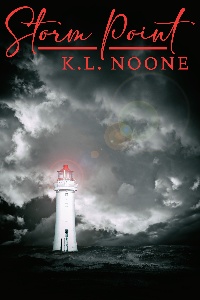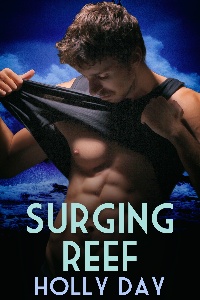Ghosts aren’t real. And historic lighthouses aren’t haunted.
At least, travel writer Eric Winters wants to believe that. But, while he’s here for a story about the Storm Point lighthouse, he’s seeing and feeling things he can’t explain. Even worse, that dark presence is summoning painful memories of the life Eric’s tried to leave behind ... and very real danger in the present.
Meredith Murray, sea-witch and lighthouse-keeper, tries to be good at his job. But ghosts aren’t his specialty, and the haunting is growing more powerful. The arrival of a gorgeous travel writer -- and obviously untrained psychic sensitive -- is a complication Mer doesn’t want. But Eric might be the answer he needs.

The ground of the path felt solid under Eric’s back, when he hit it. Solid and sharp: more pebbles, ordinary and dry. That was real. He was here. If he was here, he was breathing.
He got his lungs to believe that fact. He tried to sit up, and found that he mostly could. When he blinked the world filled with rainbow haloes, and steadied.
Steps approached, at a run. A tall shape dove to Eric’s side, in the dirt. Hand on Eric’s shoulder, a worried voice, saying, “Can you hear me? No, don’t move too much -- I can call someone, the paramedics --” The voice was deep and rich and comforting, sunbeams limning ocean depths with gold.
“No, I’m fine.” He wasn’t, exactly, but Eric did not feel up to explaining sensitivity and hallucinations to a stranger, even one with a beautiful voice. He blinked again, and focused that direction instead.
And discovered that more than the voice was attractive. The man at his side, kneeling on the rocky path, had thick black hair and sun-bronzed skin and dark stubble, attractively rugged; the man was wearing sturdy jeans and an emerald knit sweater, and his eyes were emerald too, an astonishing lapidary green. He said, while Eric was distracted by the fact of being rescued by a broad-shouldered water-god, “You’re not fine, if you’re passing out after looking at our rocks and our ocean. Are you feeling dizzy? Ill?”
Eric sighed, “No,” and moved to get up, to gather legs under himself. The sky and sun and coastal mist swam, eddied, decided to behave. “Thank you. I just sometimes ... that happens, sometimes. I’m used to it.”
“Oh, and that makes it all right, does it?” The man got up with him, and kept a hand under Eric’s elbow. They were nearly the same height, though the new helpful arrival stood a couple of inches taller and with a distressing sense of responsibility for other people; he added, “I’m not used to it. Should I call someone for you? Or at least get you out of the sun? Some water?”
“Maybe that one.” Eric rubbed a temple, winced, looked sideways at those sea-glass eyes. “You’re not used to it? You just met me. We haven’t even met, technically.”
“I was watching you from the gallery, and my name’s Meredith. Mer, if you want.” Which explained nothing, except that Meredith had a sea-name, a wild island legend to go with the eyes and the hair and the glorious tall-dark-and-handsome good looks. Mer added, “Murray. I mean the last name,” while gently but inarguably walking Eric up the short path, around the curve of the lighthouse’s white tower, to the far end of the equipment room, and then through a small back door labeled Staff Only, which revealed a comfortable break-room space, with a sofa and a tiny refrigerator and a very modern small television. “Sit down. Water.”
Eric sat obediently. The headache lingered, but it wasn’t bad. A bruise, a rug-burn, a scrape on the inside of his skull. The lighthouse itself seemed to be helping: it felt safe to his odd extra sense, a tower that wanted to fulfil its job of guiding and protecting, a place where the family of keepers had taken that responsibility seriously, generation after generation, until the building became imbued with purpose.
Mer ducked into the tiny refrigerator, returned with an unopened bottle. “Here. Drink this. Painkillers? Something for the headache?”
“No, it’s not bad.” The water helped, too: cold and certain. In the wake of the sip, the last name registered. “Murray. Any relation to --”
“Oh yes. I’m one of the family.” Meredith, with the unselfconscious ease of a man belonging to those generations of Storm Point keepers, collected a bag of trail mix from a shelf, came back over, perched on the sofa-arm next to Eric’s spot. “Here, eat something. Sugar, energy, all that. It’ll help.”
“You sound like you’ve done this before.”
Mer laughed, though the sound was wry, and ran a tanned hand through his hair, rumpling shaggy waves. A few silver streaks in the dark, matching lines around his eyes, suggested he was older than Eric’s own twenty-seven, but the tall energy and competence might belong to any age. “I have ... let’s say ... some experience with people needing assistance. And yes, I do work here, which is why we’re in the break room. If --”
The inner door opened; Eric caught a glimpse of a museum shop, busy displays, a bustle of visitors. A short brisk woman with the even curlier version of Mer’s hair, and lighter green eyes, put her head in to say, “Tom said you’d come in here; everything all right?”
“Fine,” Mer said. “Just taking care of ...” He paused, eyebrows up; Eric realized abruptly that he had not introduced himself, and flung in hastily, “Eric. Winters.”
“Taking care of Eric. He needed to sit down for a minute, after looking at the shipwreck rocks.”
The woman made an interested noise, at that. Mer said, “Go watch out for the tourists on those steps, Aunt Jen, we’re okay,” and she nodded at him and vanished to, presumably, deal with wayward tourists.
“Sorry,” Mer said. “Family. They worry.” He was still considering Eric. “Eat that.”
Eric gave in, because why not, at this point. The first sip of water, the first bites of food, did help. He said, “Thanks,” and then, because he was himself and that was a story, “Shipwreck rocks?”





